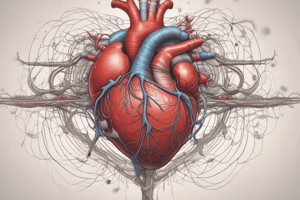Podcast
Questions and Answers
Which of the following describes the process of blood circulation that involves supplying oxygen and nutrients to organs and tissues?
Which of the following describes the process of blood circulation that involves supplying oxygen and nutrients to organs and tissues?
- Pulmonary circulation
- Coronary circulation
- Systemic circulation (correct)
- Lymphatic circulation
In the heart, which chambers receive blood from the body?
In the heart, which chambers receive blood from the body?
- Left atrium
- Right atrium (correct)
- Left ventricle
- Right ventricle
What is the main function of pulmonary circulation in the cardiovascular system?
What is the main function of pulmonary circulation in the cardiovascular system?
- Removing waste products from the blood
- Providing nutrients to cells throughout the body
- Supplying oxygen to organs and tissues
- Ensuring oxygenation of blood in the lungs (correct)
Which component of the cardiovascular system is responsible for carrying deoxygenated blood back to the heart?
Which component of the cardiovascular system is responsible for carrying deoxygenated blood back to the heart?
What determines the balance between cardiac output and venous return in the heart's pumping action?
What determines the balance between cardiac output and venous return in the heart's pumping action?
What is the role of arteries in the cardiovascular system?
What is the role of arteries in the cardiovascular system?
How do capillaries contribute to the cardiovascular system?
How do capillaries contribute to the cardiovascular system?
Which cardiovascular disease is associated with a decrease in heart and artery efficiency as the body ages?
Which cardiovascular disease is associated with a decrease in heart and artery efficiency as the body ages?
Why are larger arteries thicker and more elastic compared to smaller arteries?
Why are larger arteries thicker and more elastic compared to smaller arteries?
What is the function of veins in the cardiovascular system?
What is the function of veins in the cardiovascular system?
Study Notes
The cardiovascular system is vital for the survival of all living organisms, including humans. It provides blood supply throughout the body and plays a crucial role in the transport of nutrients and oxygen-rich blood to all parts of the body while carrying deoxygenated blood back to the heart. The cardiovascular system consists of the heart, arteries, veins, and capillaries, working together to ensure adequate blood flow to all cells and tissues.
Blood Circulation
Blood circulation is the process by which the heart pumps blood through the vessels to supply oxygen and nutrients to the body and remove waste products. The cardiovascular system is divided into two main loops, the systemic circulation and the pulmonary circulation. Systemic circulation provides blood to the organs, tissues, and cells throughout the body, while pulmonary circulation is responsible for the oxygenation of blood in the lungs and the removal of carbon dioxide.
Heart Function
The heart is a muscular organ that acts as a pump to circulate blood throughout the body. It consists of four chambers: the left and right atria (upper chambers) and the left and right ventricles (lower chambers). The atria receive blood from the body and the ventricles pump blood out of the heart. The heart's pumping action maintains a balance between cardiac output (the amount of blood pumped out by each ventricle in one minute) and venous return (the blood returning to the heart). A normal heart rate is approximately 72 beats per minute, and the cardiac cycle spreads over 0.8 seconds.
Blood Vessels
Blood vessels are critical components of the cardiovascular system. Arteries carry blood away from the heart and can divide into large and small arteries. Larger arteries receive the highest pressure of blood flow and are thicker and more elastic to accommodate the high pressures. Smaller arteries, such as arterioles, have more smooth muscle, which contracts or relaxes to regulate blood flow to specific portions of the body. Capillaries branch off of arterioles and are a single-cell layer, allowing for the exchange of nutrients, gases, and waste with tissues and organs. Veins transport blood back to the heart and contain valves to prevent the backflow of blood.
Cardiovascular Diseases
Abnormalities or injuries to any part of the cardiovascular system can result in serious health complications. Common cardiovascular diseases include coronary artery disease, heart attack, high blood pressure, and stroke. As the body ages, the heart and arteries may become less efficient, increasing the risk of high blood pressure and associated cardiovascular issues.
In conclusion, the cardiovascular system plays a vital role in maintaining the health and function of all living organisms. By understanding its components and functions, we can better appreciate the importance of maintaining a healthy cardiovascular system through proper nutrition, exercise, and other lifestyle choices.
Studying That Suits You
Use AI to generate personalized quizzes and flashcards to suit your learning preferences.
Description
Test your knowledge on the cardiovascular system, including blood circulation, heart function, blood vessels, and common cardiovascular diseases. Learn about the vital role of the heart, arteries, veins, and capillaries in maintaining overall health and well-being.




